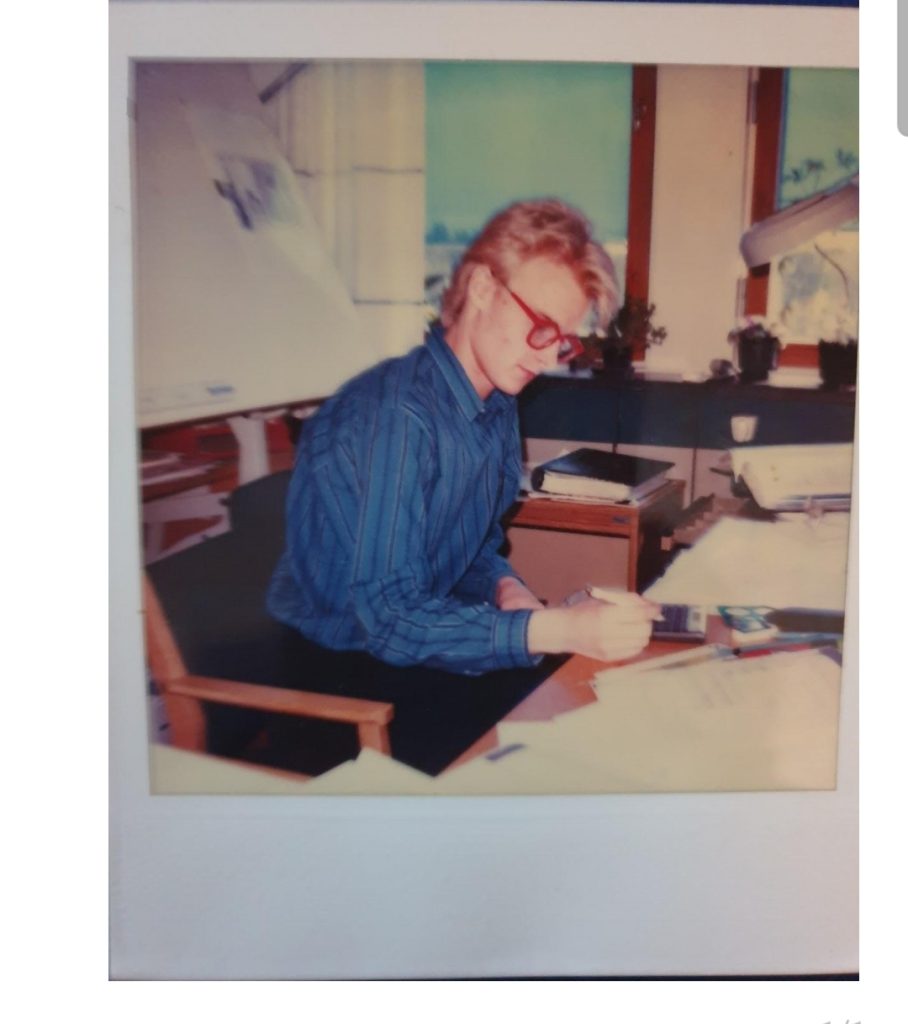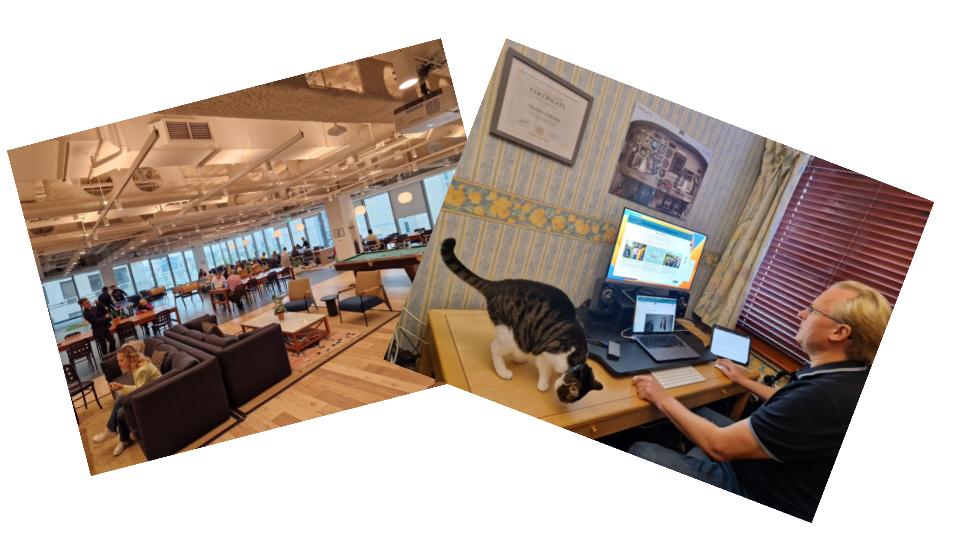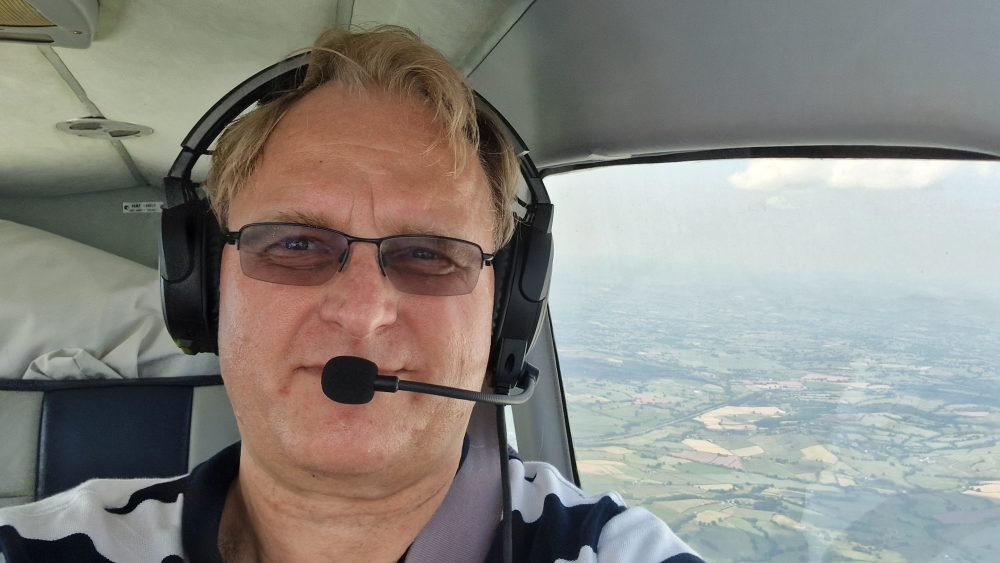Hi Christer! You are an alumnus from LTH, the Faculty of Engineering, and today you are working as Enterprise Account Executive at Coursera in London. Can you briefly tell us more about your career path from LTH to your current role? What inspired you to work within this industry?
My career started 1986 when I completed my Master’s degree in Mechanical Engineering with a specialisation in Energy at LTH, ending with my thesis work at Barsebäck’s nuclear power plant. This steered me towards my first job, advanced heat and fluid-mechanical calculations in the nuclear industry.

In those early days, the workspace was rather different. As you can see in the picture (above), you’ll notice the absence of a personal computer. Yes, of course we did have computers then, but they were larger, less accessible systems with no graphical interface. A year into my role I did get a personal computer, though interestingly, it was first put on the side-table rather than directly in front of me.
But I felt drawn to more dynamic sectors seeing growth at the time: Telco, Media and IT, and I made the leap to the IT industry. Since then my career has transitioned gradually from technical-based roles to sales, along with the industry’s evolution. It has been a fascinating journey, and we are still just in the beginning of the IT era. The technology will keep evolving and will offer many exciting job opportunities for years to come.
What does a normal workday look like for you?
The role of an Account Executive requires a fair bit of multitasking. This involves responsibilities such as market research, project management, problem-solving, commercial awareness and technical skills. By and large, this role is a people-facing role, and you often have to be proactive to drive outcomes.
Looking back at the image from my first job, it’s clear that workplaces have significantly transformed. Like many other professionals, I now work hybrid – my time is divided between the shared workplace WeWork Waterloo in London and my home office.

I do wonder how our workplaces will evolve over the next 40 years ? But the pleasure of meeting customers face-to-face, I hope, will never become outdated. It has taken me to places I wouldn’t have visited otherwise, such as into the Icelandic prime minister’s office and out into the Saudi Arabian desert.
In your opinion, what are the most significant trends or developments in the field of lifelong learning and reskilling today, and how is Coursera contributing to these trends?
Workplace skills requirements are currently in a state of flux. Rather than a singular lifelong career with in-depth knowledge in one domain, many of us will transition through various careers requiring a broader skill set. Today’s focus often highlights tech skills, but human skills are equally important. Some of the human skills in-demand now are Analytical Thinking, Creative Thinking, Resilience, Flexibility and Agility (from The World Economic Forum’s Future of Jobs report 2023).
Coursera, an online learning platform, is part of this evolving landscape. Accessible with just an internet connection, it enables continuous learning and skill development which you can carry out anytime from your work, home or even when you are travelling. In fact, Lund University is a valued partner of ours.
Click here to find Lund University courses on the Coursera platform
What advice would you give to fellow alumni and new graduates looking to embark on a journey of lifelong learning?
Be curious and keep learning – also for skills outside your comfort zone. So if you’re pursuing a technology career, consider taking a course in human skills. Conversely, if you’re in a non-tech role, familiarise yourself with some technology courses.
For instance, if you haven’t already, consider starting with a beginner’s course on Generative AI, a topic that’s receiving much attention currently. It isn’t just for tech enthusiasts. It’s accessible and beneficial for anyone, also those lacking technical skills, so take full advantage of it. It will have a profound impact, particularly for us with professional careers.
On that topic, here’s an interesting video showing Steve Jobs’ visit to Lund in 1985, he is predicting what we’re experiencing now, nearly 40 years later.
Click here to find the YouTube video with Steve Jobs in Lund 1985
What personal or professional achievements in your career journey have been particularly meaningful to you?
When I was young I had brief summer jobs in Germany and the UK. These experiences sparked my interest in working abroad, eventually leading to my relocation to the UK 25 years ago. I now feel genuinely at home in both the UK and Sweden, which feels like a privilege.
Now, with both daughters having embarked on their own university studies, I’ve chosen to pursue a new adventure: learning to fly. Currently, I am mid-way through this adventure, which involves both theoretical exams and flying lessons. It has the familiar sense of challenge similar to my student days in Lund: the gradual, often hard work with no end in sight, until one day, you suddenly realise you’ve achieved your long-term goal.
What are your brightest memories from your studies at LTH?
I still vividly remember the day I arrived in Lund in the autumn of 1982, unprepared for what lay ahead. Those four years were full of challenging studies, but also rich with fun memories of social activities at Lophtet, in the nations and corridors.
I remember all the biking, something I’ve never done so extensively since then. The biking to town from LTH was easy, but the return was always a bit of a workout.
Skryllegården, it set my standard for running 10 km trails. Luckily, I have a comparable track here in the Windsor Great Park in Berkshire, coming very close to matching the quality of Skryllegården.

